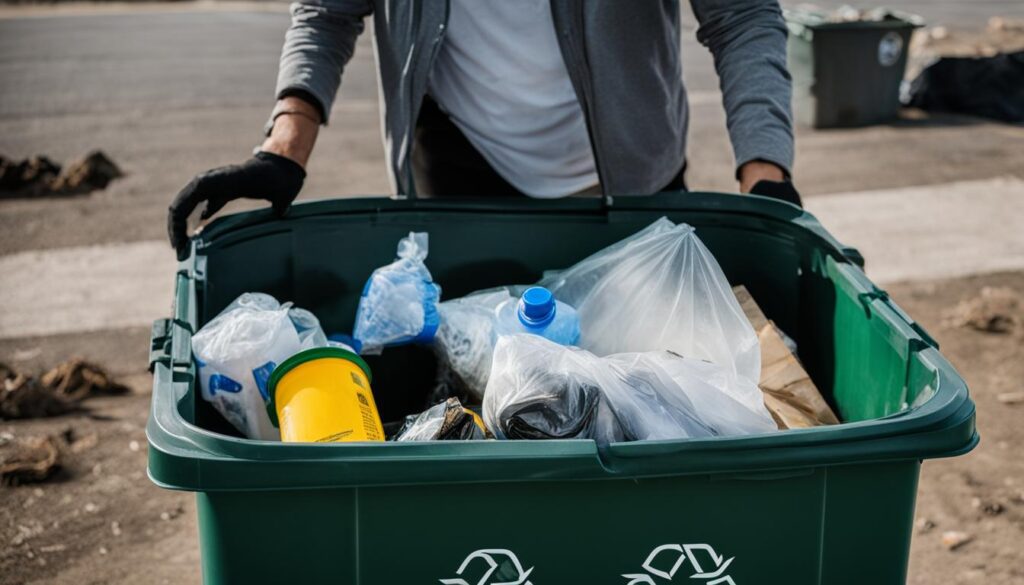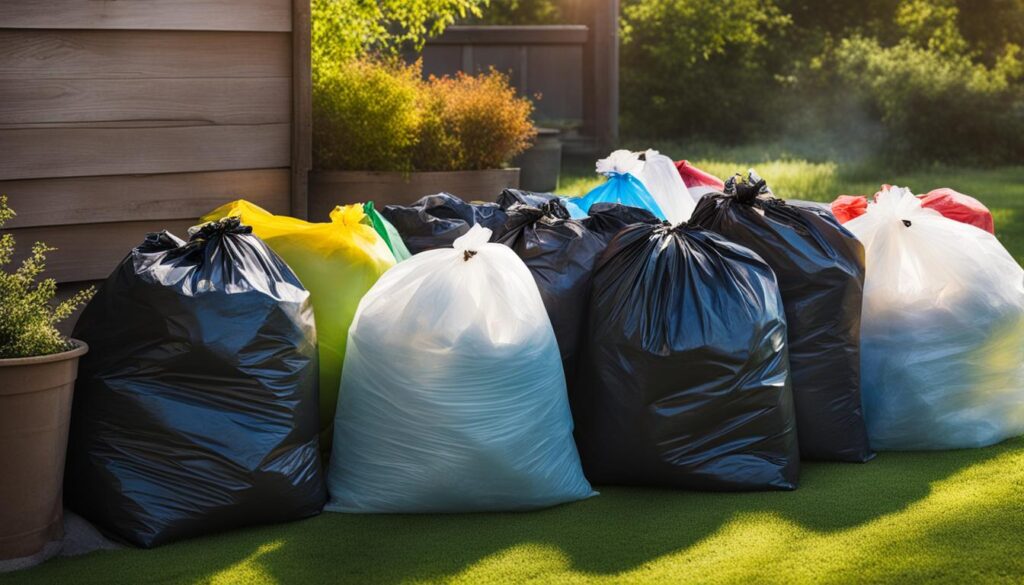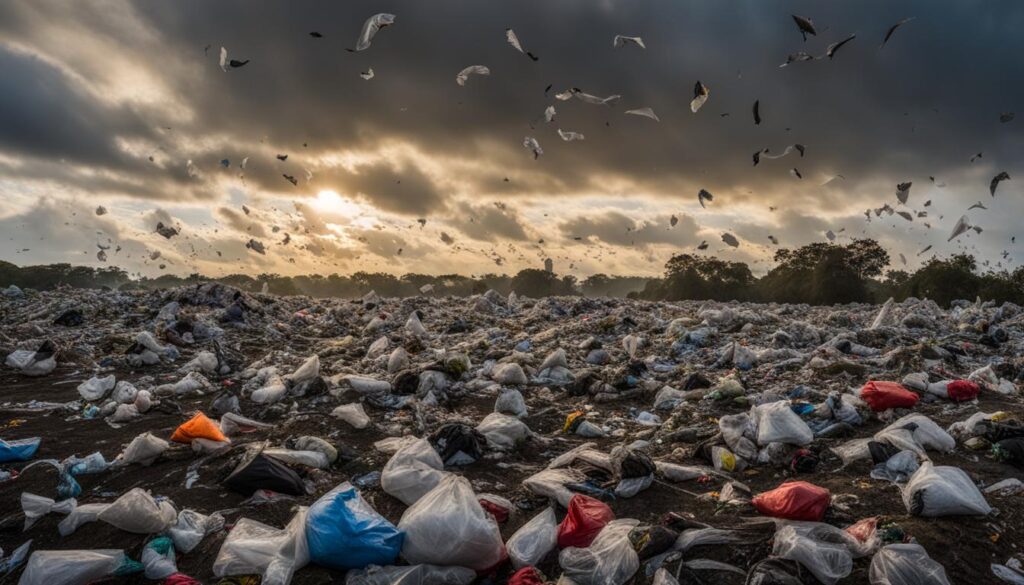Trash bags, a common household item, play a crucial role in waste management. But have you ever wondered can trash bags be recycled? In this section, we’ll explore the possibilities of recycling trash bags and discover eco-friendly alternatives for a sustainable future.
Key Takeaways:
- Regulated plastic trash bags can be recycled in California through the Recycled Content Trash Bag Program.
- Plastic bags used for groceries, hazardous waste, or medical waste are not eligible for recycling.
- Recycling plants generally do not recycle trash bags, but clean plastic bags can be recycled separately.
- Compostable bags and reusable cloth bags are environmentally friendly alternatives to plastic trash bags.
- Plastic trash bags have a significant environmental impact, contributing to plastic pollution and greenhouse gas emissions.
Types of Trash Bags
When it comes to trash bags, there are several different types available on the market. Understanding the differences between these types can help you make an informed decision about which one to choose for your specific needs.
Recycling bags: These bags are typically blue in color and are specifically designed for recyclable plastic trash. They help separate recyclable items from other waste, making recycling easier and more efficient.
Compostable trash bags: If you have organic waste that you want to dispose of in an environmentally friendly way, compostable trash bags are a great option. These bags are made from plant-based materials and can be thrown away with compost trash. They will decompose along with the organic waste, reducing the overall amount of waste sent to landfills.
Plastic garbage bags: These bags, often black in color, are the most common type of trash bags used for regular household waste. They are made from durable plastic and come in various sizes to accommodate different trash bin sizes. While they are not specifically designed for recycling, clean plastic garbage bags can be recycled separately from other recyclables.
Table: Types of Trash Bags
| Type of Trash Bag | Description |
|---|---|
| Recycling bags | Blue bags designed for recyclable plastic trash |
| Compostable trash bags | Plant-based bags for organic waste |
| Plastic garbage bags | Black bags for regular household waste |
Disposal and Recycling of Trash Bags
When it comes to the disposal of trash bags, it is important to follow proper guidelines to minimize their impact on the environment. One crucial point to note is that trash bags should not be placed in recycling bins with other recyclables. This is because plastic bags, including trash bags, can cause issues at recycling facilities and slow down the recycling process. Instead, they should be placed loose in the regular trash bin.
Although recycling plants generally do not recycle trash bags, there are some facilities that accept clean plastic bags separately for recycling. So if you would like to recycle your plastic bags, it is recommended to check if there are any recycling centers in your area that accept them. It’s worth mentioning that these recycling centers usually handle clean plastic bags only, so make sure to remove any food residues or other contaminants before recycling them.
While proper disposal is important, it is also essential to explore more sustainable options when it comes to trash bag use. One alternative to traditional plastic bags is compostable bags, which are made from plant-based materials and can decompose along with organic waste. These compostable bags provide an eco-friendly option for disposing of kitchen scraps, food waste, and other biodegradable materials.

Furthermore, opting for reusable cloth bags can also be a sustainable choice. These cloth bags can be used repeatedly, reducing the need for single-use plastic bags. By investing in reusable cloth bags, you can significantly reduce your plastic waste and contribute to a greener environment.
Benefits of Sustainable Trash Bag Options
- Reduced dependence on single-use plastic bags
- Minimized plastic waste
- Promotion of a circular economy
- Decreased environmental pollution
- Contribution to a more sustainable future
By adopting proper disposal practices and considering more sustainable alternatives like compostable bags and reusable cloth bags, you can play your part in minimizing plastic waste and promoting a more eco-friendly approach to waste management.
Alternatives to Plastic Trash Bags
When it comes to waste management, finding environmentally friendly alternatives to plastic trash bags is crucial. These alternatives can help reduce waste and minimize the harmful effects of plastic on the environment. Here are some eco-friendly options to consider:
Compostable Bags:
Compostable bags are made from plant-based materials such as cornstarch or vegetable oils. These bags can break down naturally along with organic waste, making them a sustainable option for disposing of kitchen scraps or other compostable materials. They can be used in compost bins or green waste bins, where they will decompose along with the rest of the organic matter.
Reusable Cloth Bags:
Another alternative to plastic trash bags is to use reusable cloth bags. These bags are made from durable fabric materials and can be washed and reused multiple times. They are an excellent option for general household waste and can be easily emptied into the outdoor trash bin. By using reusable cloth bags, you can significantly reduce the amount of plastic waste generated in your home.
Biodegradable Bags:
Biodegradable bags are another option to consider. These bags are typically made from cellulose or natural fibers and are designed to break down more quickly than traditional plastic bags. While they may not decompose as quickly as compostable bags, they are still a more environmentally friendly option compared to regular plastic trash bags.
Summary:
By opting for alternatives to plastic trash bags, such as compostable bags, reusable cloth bags, or biodegradable bags, you can contribute to a more sustainable waste management approach. These options help reduce waste and minimize the negative impact of plastic on the environment. Making a conscious choice to use eco-friendly trash bags is a small but significant step towards a greener future.

The Environmental Impact of Trash Bags
Trash bags, especially those made from plastic, have a significant environmental impact. Plastic trash bags contribute to plastic pollution and take a long time to decompose in landfills, releasing harmful microplastics. These microplastics can enter the marine environment and harm aquatic life through ingestion and contamination. Plastic bag pollution also affects human health, as ingesting or inhaling plastics can lead to various disorders. Additionally, the production and disposal of plastic bags contribute to greenhouse gas emissions and climate change.

“Plastic pollution is a growing concern worldwide. Plastic trash bags are a major contributor to this problem, as they are often used once and then discarded. These bags break down into smaller pieces over time, creating microplastics that can be consumed by marine animals and enter the food chain. This not only threatens marine ecosystems but also poses risks to human health.”
It is estimated that over 8 million tons of plastic end up in the oceans each year, and plastic bags are a significant part of this pollution. These bags can entangle marine animals, leading to injuries and even death. Additionally, the ingestion of plastic bags can cause digestive blockages and internal injuries in marine life. The effects of plastic bag pollution extend beyond the marine environment, as microplastics can also contaminate water sources and harm terrestrial organisms.
Addressing the environmental impact of trash bags requires a multi-faceted approach. Firstly, reducing the use of plastic bags, including trash bags, is crucial. Encouraging the use of reusable bags and promoting sustainable alternatives like compostable bags can help minimize plastic waste. Additionally, improving waste management systems to ensure proper disposal and recycling of plastic bags is essential. By taking these steps, individuals and communities can contribute to mitigating the environmental consequences of trash bags and working towards a cleaner, healthier planet.
Conclusion
When it comes to waste management, it is essential to consider the eco-friendly alternatives and sustainable practices that can help reduce plastic waste. While some types of trash bags can be recycled, the overall environmental impact of using and disposing of them is significant. By choosing to use compostable bags or reusable cloth bags, you can contribute to reducing plastic waste and minimizing the harmful effects on the environment.
Compostable bags, made from plant-based materials, provide a viable option for managing organic waste. These bags decompose along with the organic waste, minimizing the need for traditional plastic bags. Reusable cloth bags are another excellent alternative that can be used repeatedly, reducing the reliance on single-use plastic bags.
By adopting sustainable waste management practices and making conscious choices, you can actively contribute to a cleaner and greener future. Remember to dispose of trash bags properly, placing them in regular trash bins rather than recycling bins. This will help streamline the recycling process and prevent issues at recycling facilities.
Together, let’s embrace eco-friendly waste management, explore sustainable alternatives, and play our part in reducing plastic waste. By taking these small steps, you can make a big difference in protecting our environment and creating a more sustainable future.
FAQ Can Trash Bags Be Recycled
Can plastic trash bags be recycled?
Yes, regulated plastic trash bags can be recycled as part of the Recycled Content Trash Bag Program in California. However, plastic trash bags used for groceries, hazardous waste, or medical waste are not eligible for recycling.
What types of trash bags are there?
There are recycling bags, trash bags, and compostable trash bags. Recycling bags are typically blue and used for recyclable plastic trash. Compostable trash bags are used for organic waste, and plastic garbage bags, often black in color, are commonly used to hold regular household waste.
How should trash bags be disposed of?
Trash bags should not be placed in recycling bins with other recyclables. They should be placed loose in the regular trash bin. Clean plastic bags can be recycled separately from other recyclables.
Are there alternatives to plastic trash bags?
Yes, there are alternatives such as compostable bags made from plant-based materials, reusable cloth bags, and biodegradable bags made from cellulose and natural fibers.
What is the environmental impact of plastic trash bags?
Plastic trash bags contribute to plastic pollution and take a long time to decompose in landfills, releasing harmful microplastics. They can also harm the marine environment and human health through ingestion and contamination. The production and disposal of plastic bags also contribute to greenhouse gas emissions and climate change.
What can I do to promote eco-friendly waste management?
You can choose alternatives like compostable bags or reusable cloth bags to reduce plastic waste and minimize the harmful effects on the environment. By adopting sustainable practices and making conscious choices, you can contribute to a cleaner and greener future.